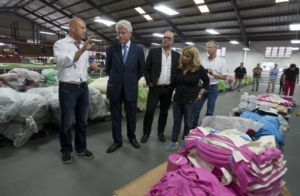
By Trenton Daniel:
PORT-AU-PRINCE, Haiti — The Clinton Foundation has awarded a $250,000 grant to a Haitian recycling plant that seeks to clean up the country’s dirty capital city.
Former President Bill Clinton, who heads the private foundation, made the announcement Tuesday before the end of a two-day trip to the Caribbean nation, where he used to serve as a United Nations special envoy. His foundation focuses on bringing investors to Haiti.
The grant goes to Sustainable Recycling Solutions, a business founded in 2012 by a team of Haitian business leaders and foreign aid workers that pays hundreds of Haitians to collect recyclable materials from trash heaps and landfills. The scraps are then sorted by type and turned into new consumer products such as clothes, lumber, furniture and toys.
The project is supposed to help clean up Port-au-Prince and neighboring districts that make up a squalid sprawl of 3 million people, while unclogging the many canals that are filled with discarded plastic bottles and other bits of trash.
“This is a big deal,” Clinton told reporters. “It will clean up Port-au-Prince. It’s good for the environment. It will stop the clogging of a lot of places in the city.”
Clinton also visited apparel manufacturer Industrial Revolution II SA, which began production in October. The company plans to funnel half its profits into a health care and education program for its 100 employees who sew T-shirts, yoga pants and other clothing for customers like Whole Foods Market Inc.
Workers earn at least 300 gourdes a day, or $6.81, which is more than Haiti’s minimum wage of 200 gourdes a day. They can earn more based on their level of productivity.
Workers in Haiti’s garment sector have protested in recent months demanding an increase in the minimum wage to 500 gourdes because they believe current wages are insufficient to live on.
The Clinton Foundation also announced it has awarded $28,000 to Fonkoze, a Haitian microfinance organization. The grant will go toward literacy programs for farmers and others in the southeastern village of Thiotte.